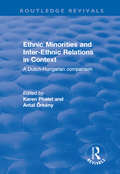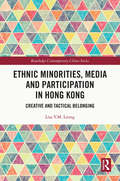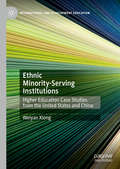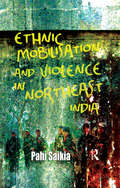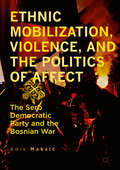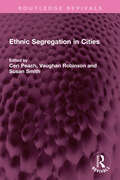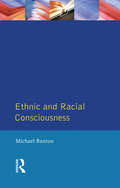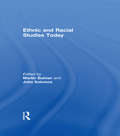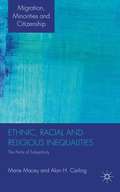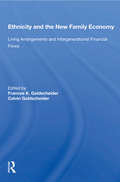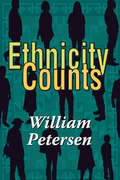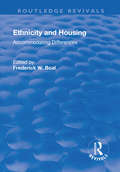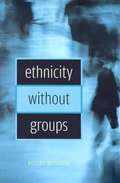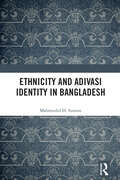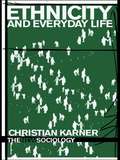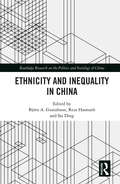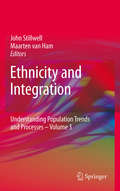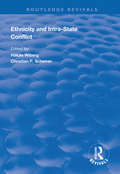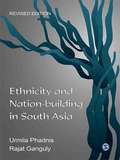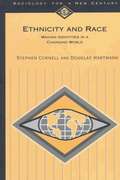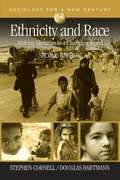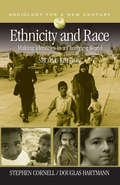- Table View
- List View
Ethnic Minorities and Inter-ethnic Relations in Context: A Dutch-Hungarian Comparison (Routledge Revivals)
by KAREN PHALET AND ANTAL ÖRKÉNYThis volume is based on papers presented on ethnic minorities and inter-ethnic relations in Hungary and The Netherlands, which were presented and discussed in three conferences and a series of meetings from 1997-1999. This work builds on comparative studies of the rise of a radical right and the mobilization of anti-immigrant feelings. It presents cross-national comparative research, due to the creedence that shifting national angles is a powerful strategic tool with which to correct national bias and to uncover submerged or overlooked aspects of specific national cases. The book brings together contributions from Hungarian and Dutch scholars in the field of ethnic minorities and inter-ethnic relations. The two countries are used as exemplary cases of distinct ethno-political patterns in Central and Western Europe. Combining complementary configurational and dimensional approaches to cross-national comparison, the diverse forms of ethnic relations in Hungary and The Netherlands are analyzed, and competing explanations of ethno-political conflict (or co-ordination) are tested in both national contexts.
Ethnic Minorities, Media and Participation in Hong Kong: Creative and Tactical Belonging (Routledge Contemporary China Series)
by Lisa Y.M. LeungSecond and third generation South and Southeast Asian minorities in Hong Kong, being marginalized from mainstream social and political affairs, have developed an ambivalent sense of belonging to their host society. Unlike their forefathers who first settled in Hong Kong under British colonial rule, these younger generations have spent their formative years in the territory. As such, they have increasingly engaged in the public and political realms of society, partly in response to the territory’s rapid political changes. Leung discusses and analyses the complex and diverse engagement of migrant and minority youths in Hong Kong - and their struggle for recognition, while desiring to 'be-long' to a place they call home. Some are joining the calls for democratic changes in the territory. In particular, she argues that much of this struggle can be seen in minorities’ involvement in creative sectors of society. While it will be of especial interest to scholars with an interest in Hong Kong, this book presents a compelling case study for anyone interested in the dynamics of migrant and minority engagement in the creative sector as a strategy for engagement.
Ethnic Minority-Serving Institutions: Higher Education Case Studies from the United States and China (International and Development Education)
by Weiyan XiongThis book presents a comparative study of the history and development of indigenous and ethnic higher education in the US and China. The author focuses on institutions serving American Indians and Alaska Natives (AIANs) and Chinese Ethnic Minorities (CEMs), such as Tribal Colleges and Universities (TCUs) in the US and Ethnic Minority Serving Institutions (EMSIs) in China. Chapters center voices within indigenous and ethnic education, including experts, senior administrators, and faculty members as well as AIAN tribal leaders and activists. These voices enrich the study and provide context to explore the issues and challenges surrounding ethnic and minority-serving higher education institutions today. Finally, the author addresses strategies and practices for the future which will better serve AIAN and CEM students and communities.
Ethnic Mobilisation and Violence in Northeast India
by Pahi SaikiaThe book is a very detailed work on the relationship between movements for autonomy by indigenous peoples (the so-called ‘tribes’) and violence in Assam, in northeast India. The book addresses some of the reasons for the failure of ethnic conflict management and for the frequent emergence of violence in the region. In particular, the historical description of movements by the Dimasas, Misings and Bodos is well compiled and provides a good summary for the readers. At the same time, the work offers a good understanding of ethnic violence in contemporary India.The volume offers some new research data based on comparative analysis of different trajectories followed by three important movements among Assam’s ethnic minorities. While the pieces of the argument are based on the existing literature on ethnic violence and contentious politics, they are effectively connected to materials drawn from northeast India. Furthermore, the book raises significant concerns on the debates on crafting of decentralised institutions and executive opportunities that may facilitate ethnic accommodation thereby reducing the likelihood of such groups to pursue their goals through channels that are radical or extreme.
Ethnic Mobilization, Violence, and the Politics of Affect: The Serb Democratic Party and the Bosnian War
by Adis MaksićThis book offers an unprecedented account of the Serb Democratic Party’s origins and its political machinations that culminated in Europe’s bloodiest conflict since World War II. Within the first two years of its existence, the nationalist movement led by the infamous genocide convict Radovan Karadzic, radically transformed Bosnian society. It politically homogenized Serbs of Bosnia-Herzegovina, mobilized them for the Bosnian War, and violently carved out a new geopolitical unit, known today as Republika Srpska. Through innovative and in-depth analysis of the Party’s discourse that makes use of the recent literature on affective cognition, the book argues that the movement’s production of existential fears, nationalist pride, and animosities towards non-Serbs were crucial for creating Serbs as a palpable group primed for violence. By exposing this nationalist agency, the book challenges a commonplace image of ethnic conflicts as clashes of long-standing ethnic nations.
Ethnic Patriotism and the East African Revival
by Derek R. PetersonEthnic Patriotism and the East African Revival shows how, in the era of African political independence, cosmopolitan Christian converts struggled with east Africa's patriots over the definition of culture and community. The book traces the history of the East African Revival, an evangelical movement that spread through much of eastern and central Africa. Its converts offered a subversive reading of culture, disavowing their compatriots and disregarding their obligations to kin. They earned the ire of east Africa's patriots, who worked to root people in place as inheritors of ancestral wisdom. This book casts religious conversion in a new light: not as an inward reorientation of belief, but as a political action that opened up novel paths of self-narration and unsettled the inventions of tradition.
Ethnic Segregation in Cities (Routledge Revivals)
by Susan Smith Vaughan Robinson Ceri PeachFirst published in 1981, Ethnic Segregation in Cities argues that race and ethnicity are fundamental to writing about the city, and that economic patterns adapt themselves to race and ethnicity rather than vice versa. The problem of ethnic segregation is a burning one for both geographers and sociologists – geographers because of the concern for all aspects of urban deprivation, and sociologists because they are discovering that space and spatial processes are important factors in influencing social segregation or assimilation. The book brings together some of the main contributors to the literature on spatial aspects of ethnicity from both sides of the Atlantic. A variety of evidence from New York, Detroit, Bradford and Blackburn address the question of whether choice on the path of ethnic members, or constraints imposed by the host society are determinant factors influencing residential segregation. This book will be of interest to students of sociology, human geography and urban studies.
Ethnic Stratification and Structural Pluralism in Guyana
by Duane EdwardsThrough a case study of Guyana, a society in which structural pluralism and ethnic/racial divisions coincide to a large extent, this book explores the specific way in which social structures interact with and affect social institutions, ethnic stratification, social actions, and both group-based and purportedly universalist ideologies. The book examines how a system of differentiation and stratification, inherited from colonial times, persists in its essential form in the current time despite attempts to dislodge it. While not falling prey to a structural determinism, the book argues, based on the evidence provided through both a historical sociological review of historical evidence and a presentist analysis of cross-sectional data on business ownership, that actions which coincide with the logic of social structures tend to prevail over actions which take that logic for granted. It is for this reason that political and social players with grand ideals have been less successful in their attempts to bridge the social and economic divides in the country, than those players whose interests coincided with the structural divides.
Ethnic and Racial Consciousness
by Michael BantonEthnic and Racial Consciousness is a completely revised version of the highly acclaimed first edition published in 1988. At that time no one expected the former Yugoslavia would break up with the brutal slaughter of neighbour by neighbour. Few would have predicted the horrific massacres in Rwanda and Burundi which have led to accusations of genocide. The ending of the cold war has been followed by struggles in the former Soviet Union in which one group has struggled for dominance and the other for independence. Ethnic conflict is now one of the main threats to peace in the contemporary world. This new edition offers an up-to-date introduction to the many issues surrounding our definition and understanding of ethnic and racial difference, racism and discrimination in general.
Ethnic and Racial Studies Today
by John Solomos Martin BulmerThis important collection addresses recent developments in the teaching, studying and presentation of race across many disciplines, including sociology, politics, social geography, cultural studies and philosophy.Drawing on the latest research in all these areas, the authors provide a comprehensive account of key controversies and debates and pinpoint new directions in research and scholarship that are likely to shape the study of race and ethnicity well into the next century.
Ethnic, Racial and Religious Inequalities
by Marie Macey Alan CarlingThis book challenges some of the most basic assumptions underpinning the growing interest in religion, including: that religion is increasing and secularisation is decreasing and that religion is the main component of identity for all minority ethnic people.
Ethnicity And The New Family Economy: Living Arrangements And Intergenerational Financial Flows
by Calvin Goldscheider Frances K. GoldscheiderThis book focuses on the way the family economy is being shaped both by changes in living arrangements and in intergenerational financial flows. It addresses issues of variations in the processes in the United States, particularly differences among ethnic, racial, and religious communities.
Ethnicity Counts
by William PetersenOfficial statistics about ethnicity in advanced societies are no better than those in less developed countries. An open industrial society is inherently fluid, and it is as hard to interpret social class and ethnic groups there as in a nearly static community. In consequence, the collection and interpretation of ethnic statistics is frequently a battleground where the groups being counted contest each element of every enumeration.William Petersen describes how ethnic identity is determined and how ethnic or racial units are counted by official statistical agencies in the United States and elsewhere. The chapters in this book cover such topics as: "Identification of Americans of European Descent," "Differentiation among Blacks," "Ethnic Relations in the Netherlands," "Two Case Studies: Japan and Switzerland," and "Who is a Jew?"Petersen argues that the general public is overly impressed by assertions about ethnicity, particularly if they are supported by numbers and graphs. The flood of American writings about race and ethnicity gives no sign of abatement. Ethnicity Counts offers an indispensible background to meaningful interpretation of statistics on ethnicity, and will be important to sociologists, historians, policymakers, and government officials.
Ethnicity Housing: Accommodating the Differences (Research In Migration And Ethnic Relations Ser.)
by Frederick W. BoalThis title was first published in 2000: This work has its origins in the 1995 Congress of the International Federation for Housing and Planning, held in Belfast. The theme was "Accommodating Differences". "Differences" were defined in broad terms, and included ethnic and social, economic and political differences. However, Frederick W. Boal's own interest in ethnic differences motivated him to invite a number of Congress participants to make available their papers for inclusion in this book of essays. It seeks to offer experience that can be drawn on by housing practitioners who are operating in multi-ethnic contexts. It also provides empirical material that should contribute to the development of more soundly-based theoretical insights in both urban sociology and social geography.
Ethnicity Without Groups
by Rogers BrubakerThat ethnicity is constructed is commonplace; this volume provides new insights into how it is constructed. By shifting the analytical focus from identity to identifications, from groups as entities to group-making projects, from shared culture to categorization, from substance to process, Brubaker shows that ethnicity, race, and nation are not things in the world but perspectives on the world: ways of seeing, interpreting, and representing the social world.
Ethnicity and Adivasi Identity in Bangladesh
by Mahmudul H. SumonThis book explores the transitions in the adivasi identity as well as in the political representation of adivasi communities in Bangladesh. It traces the use of categories such as “primitive”, “tribe”, and “adivasi” in post-colonial Bangladesh, both in the political discourse and in everyday life. The volume studies the history of these essentialized categories used for indigenous communities within the hierarchies of power and identity. It also analyses the diverse articulations of indigeneity through ethnographic narratives, exploring the formations of newer traditions and identity. The author highlights the persistence of the terms “simple” and “primitive” in contemporary discourses while also sharing examples of complex mediations and appropriation of these categories by adivasi groups in Bangladesh. This book will be of interest to researchers and students of sociology, social ethnography, social and cultural anthropology, indigenous studies, exclusion studies, development studies, political sociology, and South Asian studies.
Ethnicity and Empire in Kenya
by Myles OsborneThis book is about the creation and development of ethnic identity among the Kamba. Comprising approximately one-eighth of Kenya s population, the British considered the Kamba East Africa s premier "martial race" by the mid-twentieth century: a people with an apparent aptitude for soldiering. The reputation, indeed, was one that Kamba leaders used to leverage financial rewards from the colonial state. However, beneath this simplistic exterior was a maelstrom of argument and debate. Men and women, young and
Ethnicity and Everyday Life (The New Sociology)
by Christian KarnerMixing theories of the everyday with a wide range of case studies, this book explains the 'character' of ethnicity, from being a political tool of exclusion, to a source of meaning and solidarity, and the relationship between culture, power and identity. Combining theories of the everyday with empirical case studies, this book examines: the 'dual character' of ethnicity – as a political tool of exclusion and source of meaning/ solidarity respectively the relationship between culture, power and identity the significance of historical/socio-economic contexts to ethnicity and everyday life. This book addresses many important questions through a critical application of theories of the everyday to a series of case studies that include travellers, the South Asian diaspora, contemporary Austria, and asylum seekers in 'Fortress Europe'. This book provides an accessible and coherent introduction to the sociology of ethnicity and will be essential reading for undergraduate students on cultural studies, race and ethnic studies, and sociology courses.
Ethnicity and Inequality in China (Routledge Research on the Politics and Sociology of China)
by Reza Hasmath Bjö A. Gustafsson Sai DingThis book analyses the behaviour of ethnic minority groups in China using the first comprehensive national dataset dedicated to capturing the socio-economic profile of ethnic minorities: the China Household Ethnicity Survey (CHES). Managing ethnic diversity in China has become an increasingly important subject, especially against the backdrop of the nation’s rampant economic growth and changing institutional behaviour. The book has an analytical interest in looking at the benefactors of China’s growth from an ethnic group dimension, and notably, how the economic life of the 55 ethnic minority groups compares to the Han majority. It’s one of the first publications to capture the heterogeneity of ethnic minority groups’ socio-economic experience, through intersectional analysis and multi-disciplinary approaches. Contributing factors in explaining ethnic minorities’ experiences in the urban labour market are also considered: from how linguistic capital and migration patterns vary for ethnic minorities, to the effects of pro-rural policies. Underpinning these are questions about the extent to which happiness and discrimination impact the economic life of ethnic minorities. Ethnicity and Inequality in China will prove an invaluable resource for students and scholars of economics, sociology and contemporary Chinese Studies more broadly.
Ethnicity and Integration
by John Stillwell Maarten Van HamThe theme of this volume is ethnicity and the implications for integration of our increasingly ethnically diversified population, with topics covering demographics and migration of ethnic groups, measures of integration or segregation, health and labour market characteristics, ethnicity and crime and ethnic population projections.
Ethnicity and Intra-State Conflict: Types, Causes and Peace Strategies (Routledge Revivals)
by Christian P. Scherrer Håkan WibergPublished in 1999, this text examines domestic wars, looking at inter-state relations only in as far as they are directly relevant to understand such wars. The book aims to indicate how intra-state war differs from the inter-state war, and focuses primarily on such domestic armed conflicts that at least have significant ethnonational components. The book assesses how heterogeneous a category "ethnic conflict" is in terms of causes and consequences, and gauges the complex interplay between class, regionalism and ethnicity. It is not limited to description and causal analysis, but also attempts to assess suggestions as to what types of actors may contribute in what ways to avoiding ethnonational mobilization/polarization, avoiding militarization of manifest conflicts, and de-escalating militarized conflicts by looking for tenable generalizations on what types of approaches are fruitful in bringing about de-escalation, ceasefires, political compromises, peaceful division or peaceful integration, reconciliation.
Ethnicity and Nation-building in South Asia
by Rajat Ganguly Urmila Phadnis'This is probably the only work that deals with the entire spectrum of South Asian ethnicity and its dynamic role in regional politics. A decade and a half later after the first edition was published, the work has become even more relevant because ethnic divisions have become sharper all across the region. This updated second edition is thus welcome' - Rajeswari Pillai Rajagopalan, Contemporary South Asia First published in 1989, this widely hailed core text of the dynamics of ethnic identities and movements in the South Asian region is perhaps even more relevant today, as the region faces a resurgence of ethno-nationalist sentiments and the outbreak of new ethnic conflict. Among the features of this thoroughly revised edition are: - it provides a critical appraisal of various theoretical approaches to the study of ethnicity and nation-building - delineates the ethnic composition of the South Asian Region - examines the specific state structures of the countries studied: India, Pakistan, Bangladesh, Sri Lanka, Nepal, Bhutan and the Maldives - discusses various ethnic movements in these countries - covers the most recent developments in the region
Ethnicity and Race: Making Identities in a Changing World
by Douglas Hartmann Stephen E. CornellEthnicity and Race uses extended case studies from all over the world to craft a compelling, even-handed account of the power and persistence of ethnicity and race in the world.
Ethnicity and Race: Making Identities in a Changing World
by Douglas Hartmann Stephen CornellCornell (sociology, U. of Arizona) and Hartmann (sociology, U. of Minnesota, Minneapolis) present an updated edition of their textbook for advanced undergraduate courses on race and ethnicity in the departments of sociology, ethnic studies, global studies, and anthropology. Revised throughout with new illustrative or empirical materials and updated references, the text includes new discussion of assimilation, the invisibility of racial dominance, and paradigms and analytical frames for understanding group relations, and a new case study on race, culture, and belonging in contemporary France. Annotation ©2007 Book News, Inc., Portland, OR (booknews.com)
Ethnicity and Race: Making Identities in a Changing World
by Douglas Hartmann Stephen E. Cornell"This book is very well written and clearly organized throughout. It is pitched at upper-level undergraduate and graduate-level race and ethnicity students...in sum, this is an important book, highly recommended to students and faculty alike. The authors draw extensively from classic and contemporary sociological theory throughout the text and maintain a transnational focus in each and every chapter." —TEACHING SOCIOLOGYEthnicity and Race: Making Identities in a Changing World, Second Edition uses examples and extended case studies from all over the world to craft a compelling, even-handed account of the power and persistence of ethnicity and race in the contemporary world. Known for its conceptual clarity, world-historical scope, and fair-minded treatment of these oft controversial topics, this updated and expanded edition retains all of the core elements and constructionist insights of the original.
